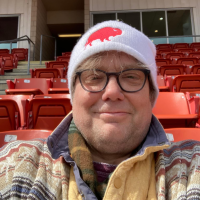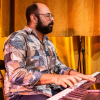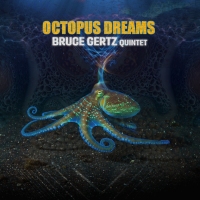Home » Jazz Articles » Interview » Linda May Han Oh: Music In The Moment
Linda May Han Oh: Music In The Moment

Courtesy Shervin Lainez
Things always happen that could be unexpected but there's never a complacency. That’s the key. A lot of that comes from the sheer gratitude of making music and the passion and love for it.
—Linda May Han Oh
Strange Heavens features Ambrose Akinmusire (trumpet) and Tyshawn Sorey (drums) from Akinmusire's Honey From A Winter Stone which I called "a dazzling kaleidoscope of jazz, hip-hop, and chamber music."
We spoke on September 5, 2025. This interview has been edited for content and clarity.
All About Jazz: It seems to me that you and Ambrose and Tyshawn Sorey are kindred spirits as far as how you approach jazz. Is that fair to say?
Linda May Han Oh: I'm in awe of Ambrose and Tyshawn so it's hard for me to say kindred spirits, but I think we all have very similar values when it comes to playing music and why we play music. I'm so indebted to them for bringing their presence and creativity to the record. They're such incredible listeners and beautiful improvisers. It always keeps things very fresh. I have to be on my toes and very much in the moment. And I love that when it comes to playing with musicians and improvising with people.
AAJ: You say the three of you share the same values. What do you mean?
LMHO: Acceptance of the moment and the constant searching for something else. I think each time we play I can very truthfully say that there's never a complacency, there's never a moment of "zoning out." Things always happen that could be unexpected but there's never a complacency. That's the key. A lot of that comes from the sheer gratitude of making music and the passion and love for it.
AAJ: When you mention "in the moment" I think of a story Herbie Hancock told about when he was playing with Miles Davis in Stuttgart in 1963. Miles was soloing during "So What?" and Hancock played a wrong chord. Instead of getting upset, Miles played notes that made his chord right. For Miles there was no "right" or "wrong" notes. There is just what was out there at the moment. Is that kind of what you're talking about?
LMHO: Yeah, for sure. That's definitely part of it. I guess that's what is happening, embracing the moment and sort of saying "yes" instead of necessarily muscling your own way into trying to make something right or wrong. It's more about accepting what is happening and running with it.
AAJ: Please tell me about your origins.
LMHO: I was born in Malaysia and I grew up in Perth, Western Australia. I started playing classical piano when I was four years old along with my older sisters.
My mother never had the chance to learn piano, so she always wanted that for us. Like well-behaved Asian kids, it was kind of the right thing to do (laughs). I learned about emotion and expression in music. As I got older, I started playing clarinet and bassoon in school. Bless public schools that have music programs.
AAJ: Amen. Shout out to public school music teachers! You are doing God's work!
LMHO: Exactly. I learned a lot from them. I started playing bassoon in high school orchestras and I really fell in love with that. Around that time an uncle gave us an electric bass and I started teaching myself. I was just playing along with the radio, with records, then in a garage band and the school jazz band. At the same time, I was also playing bassoon in an orchestra that would feature composers from the jazz department at the Perth Academy of Performing Arts.
So I would play bassoon in the woodwind section and then turn around and hear players like saxophonist Troy Roberts who is now living in Perth and Dane Alderson who's currently the bassist for the Yellowjackets. There were some great musicians in Perth when I was coming up. I was watching this in high school and I really wanted to learn how to improvise. I was inspired by bass players like Jaco Pastorius, James Jamerson, Flea from the Chili Peppers . . . it was something I really fell in love with.
I wanted to learn a lot more so after high school, I went to the Western Australia Academy of Performing Arts to study jazz. I started listening to Ray Brown on "Night Train," Charles Mingus, Charles Mingus, and Dave Holland. I really fell in love with upright bass and I haven't looked back since picking it up. I've always loved the bass frequencies. I love the foundational root of these instruments, bassoon and bass, but at the same time they can be so melodic and lyrical in other registers as well.
AAJ: Tell me about your transition from high school to the conservatory.
LMHO: I started trying it out, teaching myself the last year of high school, but I really was not good at all. It was a big learning curve. I had an older sister who was exposing me to all sorts of music at a time where there's no YouTube, no Spotify or Apple Music. So she hit me up to all these great records, all eras of Miles Davis. It was at the Western Australian Academy of Performing Arts where I really started to transcribe a lot and began to really work hard on the instrument. It was a big learning curve to get my hands around the upright bass.
AAJ: Tell me about the music scene in Perth.
LMHO: We have a really strong music scene. It is one of the most isolated major cities in the world, in the sense that it is probably the farthest place you could get to from New York. If you drilled a hole in Manhattan through the earth, you'd probably come out of the ocean near the coast of Perth. But we have a lot of great exports from Perth and a lot of interesting art and music from Perth and Fremantle, which is a small town just south of Perth. I mentioned Dane Alderson and Troy Roberts are from Perth as is (actor) Heath Ledger. They are our claims to fame but there was a lot of music happening when I was in high school and that's what inspired me to pursue music. Australia has a pretty strong rock scene as well. I think of Men At Work...
AAJ: I love Colin Hay! His stuff since Men at Work is actually better.
LMHO: Yeah. So, there's a lot of strong rock that has come from that's why we have really great guitarists and a really great music scene. It's not so often that musicians tour through Perth because it's so far. People often go to Melbourne and Sydney, but we were very lucky to have had some great artists. Gary Bartz would come quite often as did Ingrid Jensen and Allison Miller. So, thank goodness for touring and being exposed to those musicians.
AAJ: Obviously you left the Perth music scene. Please tell me about that. Where did you go?
LMHO: When I was 19 years old, I performed at the (now defunct) International Association of Jazz Education (IAJE) conference. I performed in New York City and that was my first taste of New York and I knew I had to go back. I applied for my Masters a couple years later at the Manhattan School of Music and I moved to New York City. Some of my first gigs coming out of that time were with Kenny Barron, Dave Douglas, and Joe Lovano and through playing with them that's when I met Pat Metheny.
I've had a really great experience since moving and just meeting and working with so many incredible musicians.
AAJ: You have played with some of the best. Many people would be content to work with these great musicians. What made you want to compose and lead your own band?
LMHO: When I first moved to New York I had no interest at all in being a band leader. I was really influenced by musicians such as Larry Grenadier and James Genus, who was a big hero of mine, who plays with everybody but never has released his own album. So that really was my intent. I just wanted to be a strong bassist. But as I spent more time in New York, I really enjoyed composing. I loved putting together a project and seeing it grow. Although it's quite challenging being a band leader it's also incredibly rewarding. Bringing life to someone else's music as a band member and being a leader and composer are two different perspectives. I think being able to be a side person and a leader is very valuable.
AAJ: I'd like to discuss your new album,
LMHO: Strange Heavens refers to the idea that as human beings, we will often favor living in a familiar hell rather than searching for an unfamiliar or a strange heaven.
AAJ: Was the music composed or improvised?
LMHO:: Each song is a composition with a theme that includes different elements of improvisation. Each song has a rhythm and a time signature and a section that deals with tonality. That's the composed part. Beyond that it's kind of up to us what we want to bring to it. So there's a road map, there's a melody and changes, but we can choose to deal with it within those parameters.
AAJ: Would you call your work free jazz?
LMHO: I wouldn't call it free jazz because there is a composed form. In saying that, however, there are albums that I would consider "free jazz" that still have composed sections. I guess the proportion of what's composed and what isn't and what incorporates improvisation without parameters is less composed than most. So essentially no, but it incorporates elements of free jazz.
AAJ: Strange Heavens has no piano or guitar, no harmony instrument. I'm thinking of similar horn trios such as Gerry Mulligan and, more recently, Joni Mitchell. I recall his trio version of George Michael's "Faith." Was any of that in your head?
LMHO: In a sense Strange Heavens is a sequel to my debut album Entry which was a trumpet trio as well, with Ambrose and Obed Calvaire on drums. So I've already done that in my first record. This is sort of a hearkening back to that. I'm thinking, "how can we fill the space and how can we create some beautiful textures and harmonies not having piano or guitar?" You can have just one melody because as humans who listen to music we tend to make up our own harmonies.
"Acapella" on Strange Heavens was inspired by Joni Mitchell's "The Fiddle and the Drum" in which she sang alone, just one vocal line. You can hear all the harmony and the key changes that she is inferring just by one melody, so you don't need full chords to hear harmony.
AAJ: Is there anything else you would like the listeners of Strange Heavens to know about your music?
LMHO: I hope they enjoy it. I hope they're moved by it. A lot of the melodies that I composed were in many ways quite emotional for me, and I hope they can use it how they will.
AAJ: Thank you for speaking with me today.
LMHO: It was my pleasure.
Tags
PREVIOUS / NEXT
Linda May Han Oh Concerts
Support All About Jazz
 All About Jazz has been a pillar of jazz since 1995, championing it as an art form and, more importantly, supporting the musicians who make it. Our enduring commitment has made "AAJ" one of the most culturally important websites of its kind, read by hundreds of thousands of fans, musicians and industry figures every month.
All About Jazz has been a pillar of jazz since 1995, championing it as an art form and, more importantly, supporting the musicians who make it. Our enduring commitment has made "AAJ" one of the most culturally important websites of its kind, read by hundreds of thousands of fans, musicians and industry figures every month.





















